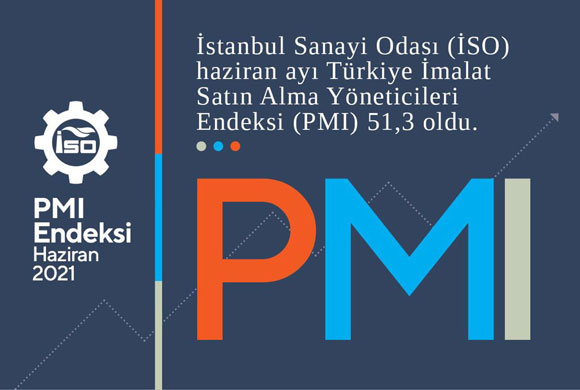News
June 2021 Report of ICI Türkiye Manufacturing PMI and Türkiye Sector PMI Released
- 01.07.2021
- News

The headline PMI of the Istanbul Chamber of Industry (ICI) Türkiye Manufacturing PMI survey, which is the fastest and reliable reference accepted in manufacturing industry performance of the economic growth, moved back above the 50.0 no-change mark in June, posting 51.3. The loosening of restrictions imposed to prevent the spread of the COVID-19 pandemic was central to the return to growth at the end of the second quarter, with both output and new orders increasing during June.
The latest PMI® survey data from Istanbul Chamber of Industry signalled that many sectors returned to growth during June following the loosening of COVID-19 restrictions. The number of sectors with increased output was doubled compared to May, reaching six sectors. And half of the sectors recorded total new orders. Seven sectors saw growth in exports, and employment increased in most of the sectors.
The June 2021 period of Istanbul Chamber of Industry (ISO) Türkiye Manufacturing PMI (Purchasing Managers’ Index) survey, which is the fastest and reliable reference accepted in manufacturing industry performance of the economic growth was announced. According to the results of the survey where any figure greater than 50.0 indicates overall improvement of the sector, the headline PMI moved back above the 50.0 no-change mark in June, posting 51.3 following a reading of 49.3 in May. The loosening of restrictions imposed to prevent the spread of the COVID-19 pandemic was central to the return to growth at the end of the second quarter, with both output and new orders increasing during June. New business from abroad also expanded, and at the fastest pace since January. There were some reports from firms that difficulties securing raw materials had prevented a sharper increase in production. Suppliers’ delivery times lengthened markedly again in June, albeit to the least extent since last September. Challenges in sourcing materials also meant that stocks of purchases continued to fall, despite a return to growth of input buying. Stocks of finished goods also decreased as manufacturers used inventories to help fulfil new orders amid difficulties finding materials.
Higher output requirements encouraged firms to expand workforce numbers again at the end of the second quarter. Employment increased for the thirteenth successive month, and at a modest pace that was faster than that seen in May.
The rate of input cost inflation quickened to a six-month high in June. Panelists often linked higher input prices to currency weakness in Turkish Lira, while there were also reports of higher costs for raw materials such as metals. Firms responded to higher cost burdens by raising their own selling prices. Charges increased sharply, and at the fastest pace since September 2018.
Commenting on the Istanbul Chamber of Industry Türkiye Manufacturing PMI survey data, Andrew Harker, Economics Director at IHS Markit, said:
“With COVID-19 cases having fallen sharply and restrictions easing, Turkish manufacturers were able to record a return to growth in June, and will be hoping that the upward trends continue in the months to come. “There were some suggestions that growth could have been even stronger were it not for the ongoing difficulties in sourcing raw materials, with firms struggling to build input inventories and having to dip into stocks of finished goods to help fulfil new orders.
Most of the sectors returned to growth
The latest PMI® survey data from Istanbul Chamber of Industry and IHS Markit signalled that the Turkish manufacturing sector returned to growth during June following the loosening of COVID-19 restrictions as a result of the decrease in case numbers. The number of sectors showing output expansion was doubled in June compared to May, reaching six sectors. There was a strong increase in output, especially in clothing and leather products sector, while the significant deceleration was seen in machinery and metal products. And half of the sectors recorded total new orders. The outlook for exports was much positive, seeing growth in export in seven sectors. Employment increased in most of the sectors, too. The only sector that decreased its workforce numbers was clothing and leather products.
The survey findings show that the manufacturing sector, in general, continues to face difficulties in supply chain. The sharpest increase in suppliers’ delivery times was in electrical and electronic product manufacturers. Accordingly, the highest input cost inflation was again in the electrical and electronic products sector.
In general, the input cost inflation quickened in eight of 10 sectors. The slightest increase in input costs was in chemicals, plastics and rubber products manufacturers. The highest inflation in sales prices was seen in non-metallic mineral products sector. Like in the input costs, the sales prices inflation also quickened in most of the sectors compared to May. The lowest increase in sales prices was measured in land and sea vehicles manufacturers. As a result of the recovery signs in output and new orders, five of the 10 monitored sectors saw increase in purchasing activities. In addition, input inventories decreased in all sectors, except for the food products, due to the above-mentioned difficulties in supply chain. The sharpest decrease in pre-production inventories was in machinery and metal products sector. Data marked a decrease in general in final product inventories in the end of the second quarter.